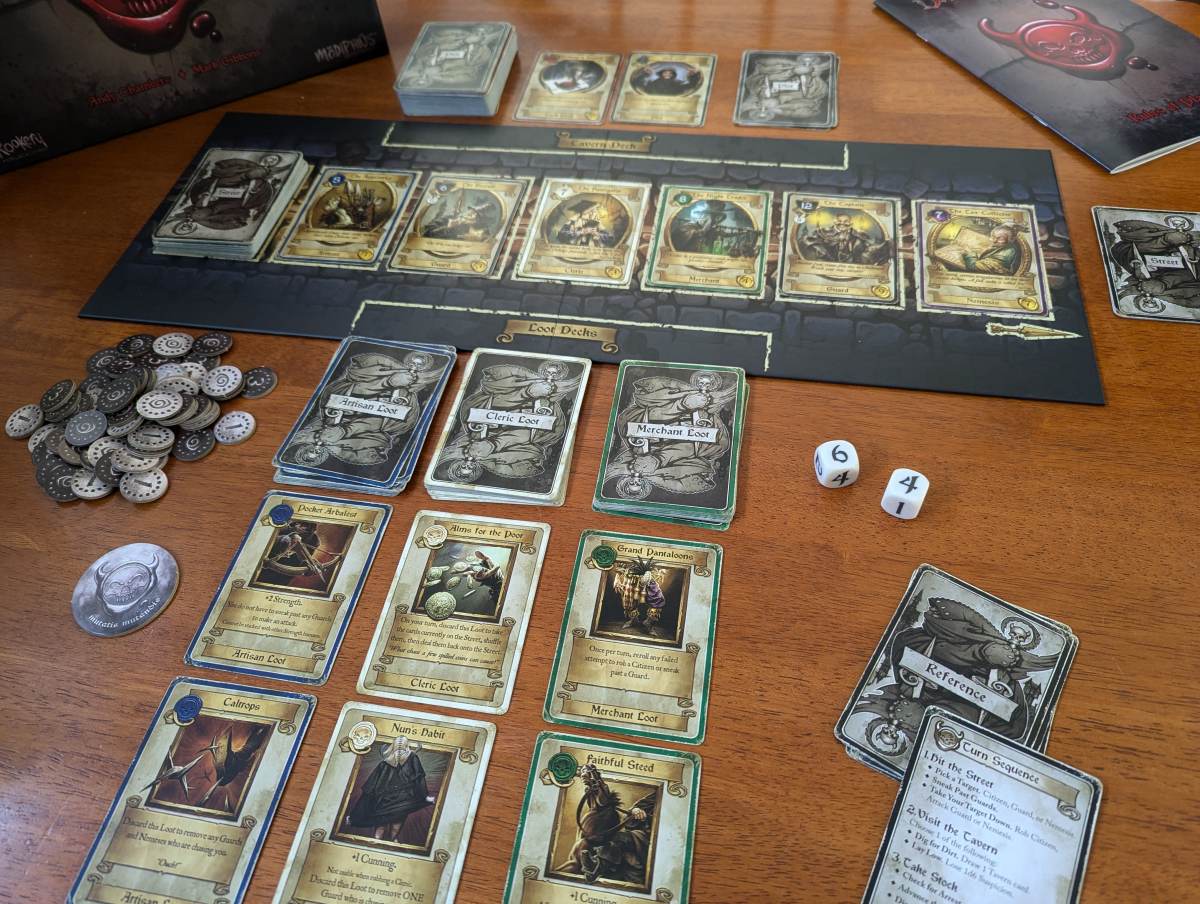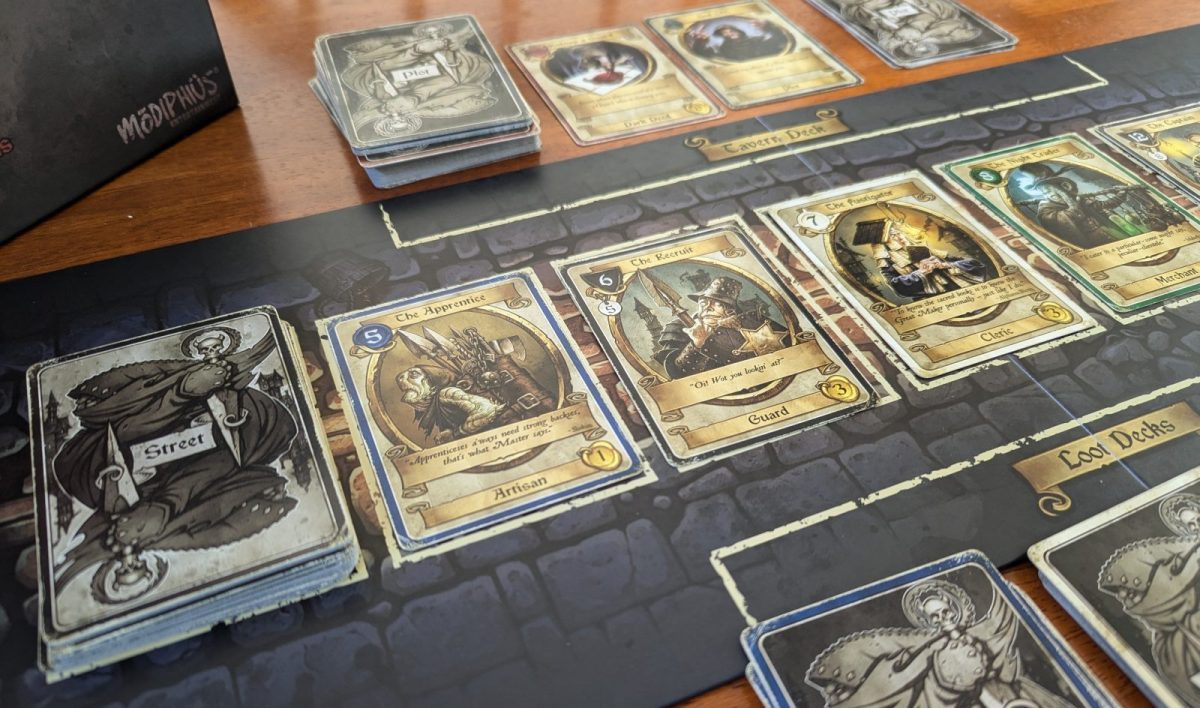I first got into Warhammer 40,000 a few months after starting high school in 2000. Nostalgia surely plays a part in my indelible fondness for that era of the hobby, but to be fair, a lot of long-time fans seem to look back on the early 2000’s with particular affection. The ruleset was tight but thematic, and the narrative fluff surrounding it struck a fun balance between grim and silly.
Though many incredible designers, sculptors, writers, and artists were responsible for this golden age, all of them plied their craft under the leadership of ‘40k Overfiend’ Andy Chambers. So when a PR email landed in my inbox announcing the re-release of Dark Deeds, a relatively obscure tabletop game Chambers co-designed some years after his departure from Warhammer-makers Games Workshop, I was IMMEDIATELY interested.
Taking place in a ye-olde English city that feels like if Terry Pratchett wrote Mordheim, Dark Deeds sees two to five players compete to accumulate the most favour from their dark god. The way they do so is by robbing citizens, murdering guards, and completing randomly drawn ‘Dark Deed’ quest cards.
Naturally, the more of these acts that get committed by each player, the higher the degree of suspicion that befalls them from the local authorities. The challenge lies in keeping these elements in balance while increasing your power and versatility through the stealing of loot, all while messing with your rivals through strategic deployment of devious plots.
It is with abject delight that I tell you this now, Dark Deeds is a blast.
We’re off to merrily do some crimes
The Dark Deeds board is split into three zones. The Tavern, where play-manipulating Plot cards and quest-like Dark Deed cards are acquired. The Street, upon which Citizen, Guard, and Nemesis dramatis personae cards move down and are targeted by players. And lastly, a Loot Decks space, where three stacks of powerfully player-buffing treasure cards are laid out (each of which corresponds to the three different varieties of robbable Citizen).
At the beginning of the game, each player is randomly dealt two Dark Deed and three Plot cards. The rest are shuffled together to form the Tavern deck, with the top two being drawn and laid out adjacent to it.
The Street deck comprises all Citizen, Guard, and Nemesis cards. Six are drawn from the deck and laid out in a line alongside it, representing available targets for the player on their turn. Each of these, (along with the Dark Deed cards), has a ‘Favour’ score in their bottom-right corner which represents how many victory points they’re worth at the end of the game.
However, that same Favour value also determines how many Suspicion tokens a player acquires upon the successful robbery or murder, with increased heat befalling the player with the highest amount at any given time.

Strategic skullduggery
In Dark Deeds, a player’s turn is split into three phases. First comes ‘hit the street’, where the player picks their target from the line-up and attempts to take it down. The player must always enter the street from the right, and can only engage with one target. If they wish to rob a Citizen and score a piece of powerful loot from their respective treasure deck, they’ll have to successfully sneak past any Guards in the way first by rolling above the Perception value listed on each Guard card that stands in the way.
If they wish to attempt to murder a Guard or Nemesis as their one target action instead, they must roll above that card’s Defence value. A failed attack on a Guard makes them give chase to the player and adds one Suspicion point to their pool. A Guard in chase of you acts as a barrier to the player before they can even hit the street itself, and must be snuck past or murdered as if they were on the street line-up. There’s no limit as to how many Guards can chase you simultaneously, but there are Dark Deed cards that score when multiple do.
The second phase is ‘visit the tavern’, where the player makes one of two choices. They may either lower their Suspicion by 1D6, or take a Plot or Dark Deed card from the Tavern zone. Players may only hold up to six of these cards and may never discard a Dark Deed.
Phase three is ‘take stock’. If a player reaches this phase while having 10 or more Suspicion and being chased, they get arrested and lose all of their Loot cards, Suspicion, and the pursuit of any Guards chasing them.
As their turn ends, the whole Street row shuffles along to the right, with gaps being repopulated from the deck. If the card in the right-most slot is a Citizen, it is discarded. If it’s a guard, it gives chase to the player with the highest amount of Suspicion, and if it’s a Nemesis, it gives chase to the player whose turn is now ending. This mechanic cleverly keeps the Street deck moving, while also allowing players plenty of opportunity to sic the fuzz on their rivals.
One Plot card can be used by the player during each phase of their turn, allowing all manner of mischief and combo creation to occur. Some Plot cards even function just like Instants in Magic: The Gathering, able to be played at any time by anyone. It’s all delightfully devilish!

However…
With three players a game of Dark Deeds will run for about an hour, and due to the way that the endgame triggers, I expect that upping to four or five shouldn’t really make it run any longer. The ruleset clicked for us after the first turn, and we absolutely loved playing it. There are really only two things I can knock it for.
Firstly, the Dark Deeds rulebook itself is a bit of a faff, and is something that I’d expect to be much more clear given that the whole game is a re-release. Secondly, the nature of the game can lead to a player getting boxed-in by chasing Guards before acquiring enough Loot cards to deal with them. Given how many ways there are to score Favour points, this isn’t game-breaking, but it was frustrating spending much of the game with fewer practical choices open during many of my ‘hit the street’ phases.
May your patron smile upon you, you right bastard
A perfect marriage of tone and mechanics, Dark Deeds is tremendous fun. My friends and I took great glee in using the poor denizens of the street in plots against one another – so much so that I’ve absolutely no doubt that Dark Deeds is a game that we’ll come back to again and again in the months and years to come.
It does delight me to be so greatly enjoying a tabletop game from Mr. Chambers more than 20 years after first falling in love with his design sensibility and brand of humour, though. What an unexpected gift from the dark gods above.
4 stars: ★★★★
Dark Deeds
Designers: Andy Chambers, Mark Gibbons, Ryan Miller
Publisher(s): Rookery Publications, Modiphius Entertainment
GamesHub reviews were previously rated on a five-point scale. As of 29 July 2024, they have been rated on a ten-point scale.





